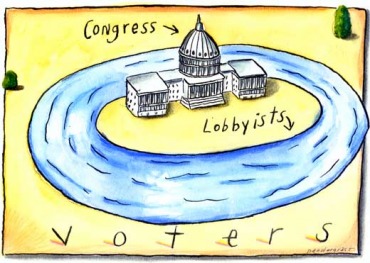Lobbyists
What are they?
"Whether lobbyists work for a large organization, a private individual, or the general public, their goals and strategies are the same. First and foremost, lobbyists must be adept at the art of persuasion, which is the mainstay of their job. They must figure out how to sway politicians to vote on legislation in a way that favors the interest they represent. This means tailoring appeals to specific individuals as well as to group voting blocs, such as Southerners or pro-choicers. Lobbyists also occasionally lobby one another. When normally opposing groups find a common area of interest and can present a united front they are extremely effective. Lobbying can be direct or indirect. Direct lobbying means actually meeting with congressmen and providing them with information pertinent to a bill being voted on. The lobbyist imparts her information with the help of graphs, charts, polls, and reports that she has hunted up or created. Needless to say, this is usually information that the politician might not otherwise have access to, that casts the matter in a light favorable to the interest the lobbyist represents. Sometimes, lobbyists will even sit down and help a politician draft legislation that is advantageous for their interest. Maintaining good relations with politicians who can be relied on to support the lobbyist’s interest is key. While lobbyists and their employers cannot themselves make large campaign donations to politicians, they can, and do, raise money from other sources for reelection campaigns. To be successful at all of this, the lobbyist must be well-informed, persuasive, and self-confident."
What are they up to?
Lobbyists are frantically trying to get as many reforms passed as they can before the Bush Administration is out of office. They foresee the high probability of a Democratic White House come election time. Republicans are more receptive to the desires presented by the lobbyists, so lobbyists are pressing the business friendly Republicans for reforms that will be much more difficult for them to accomplish in a Democratically controlled government. They seek to lower sick days that they are required to offer to employees and environmental regulations that lower their profit margins.
Businesses have also begun to hire Democratic lobbyists and donate large amounts of money to Democratic campaigns in the hopes of gaining Democratic allies for the future (Pear).
What's new in the world of Lobbying?
New rules were put into effect in August that regulate the actions that lobbyists can take to attract politicians to their cause. They can no longer buy them dinner or give gifts valued at much more than $10. Strict penalties arise if they do: up to $200,000 in fines and five years in prison. This is greatly changing the way that lobbyists go about their job. They have to constantly keep record of their spending and it is harder for them to draw the attention of politicians without being able to offer incentives (Kirkpatrick).
I think this is for the best. It should hopefully lower corruption in our government and take away some of the power that large corporations are able to gain with the help of politicians that they lobbied.

